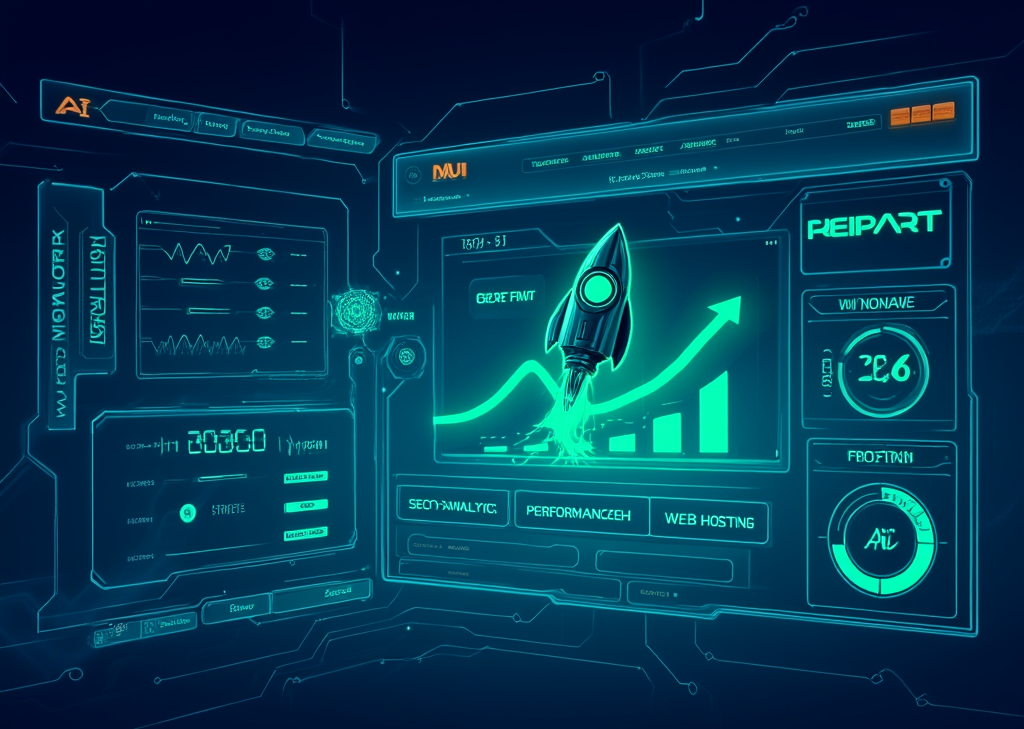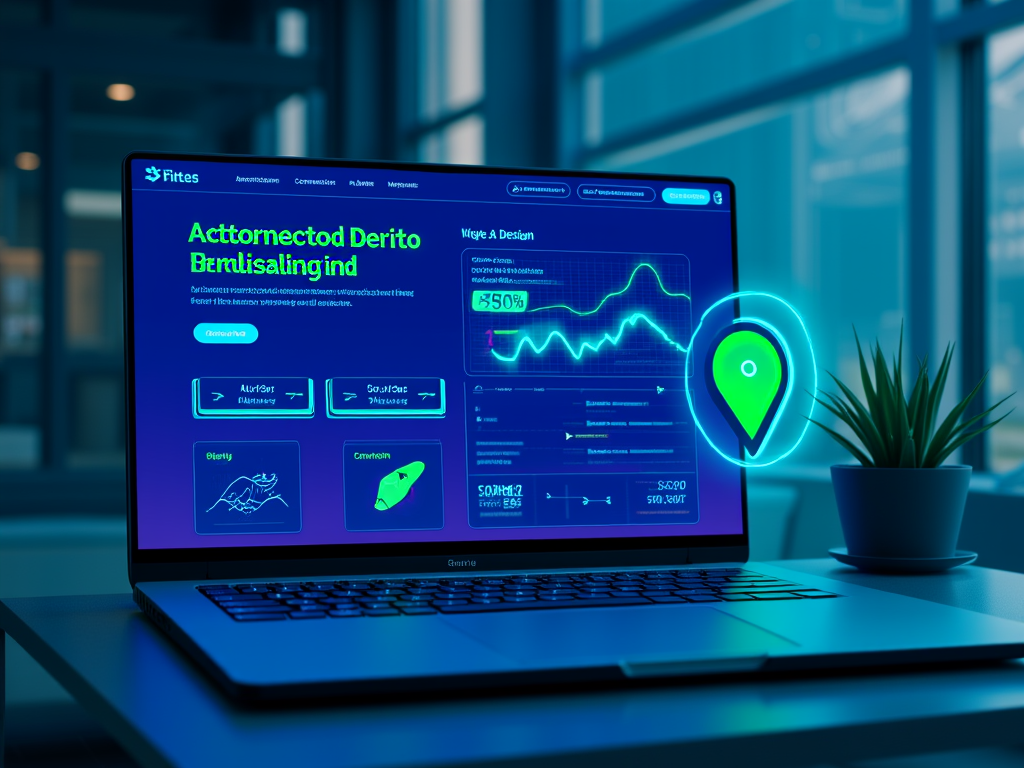Leveraging AI analytics to improve website performance
Introduction
In the fast-paced digital world we inhabit, ensuring your website performs well isn’t just a luxury — it’s a necessity. The competition is fierce, and your visitors won't hesitate to click away if the experience isn't seamless. Enter the realm of AI analytics, transforming how we perceive, measure, and enhance website performance. From elevating site speed to crafting ultra-personalized user experiences, AI is not just a tool; it's the catalyst that keeps your website not just relevant, but ahead of the game.
How AI Enhances Website Performance
Let’s peel back the layers and dig deep into how AI is shaping the very fabric of online interactions:
1. Code Optimization
Think of your website’s code as a sprawling metropolis. Over time, outdated buildings (or in this case, redundant code) can obstruct smooth traffic flow. AI swoops in like an urban planner, analyzing your site’s code architecture to pinpoint and eliminate inefficiencies. By minimizing unnecessary HTTP requests, AI significantly enhances load times, giving your users the smooth experience they expect.
2. Image and Media Optimization
Visual content can be a double-edged sword. While captivating images and videos engage users, they can also slow down your site’s performance. Here, AI acts like a skilled editor — automatically resizing and compressing media based on the user’s device and connection. Imagine delivering crystal-clear images without a hitch, regardless of whether your audience is on a high-speed connection or using mobile data.
3. Dynamic Caching
Predictive analytics puts the ‘smart’ in caching. AI can analyze user behavior to determine what content is most likely to be accessed next. Instead of cache hits being a hit-or-miss affair, AI ensures your most relevant content is available instantly, transforming sluggish load times into fleeting moments of patience for your users.
4. Predictive Page Navigation
Imagine visiting a site and finding the exact page you were looking for already primed and ready. With AI, this dream turns into reality through predictive page navigation. By anticipating user actions, AI can prerender pages, making them available before users even click.
5. Automated Technical SEO Fixes
Behind the scenes of high traffic lies a web of technical issues that can quietly sabotage your SEO efforts. Thankfully, AI tools continuously monitor your site, alerting you to broken links, slow resources, and incorrect redirects. These automated diagnostics ensure your digital storefront remains inviting and seamless to navigate.
For example, studies have shown that websites utilizing AI optimization can slash page load times by up to 80%, leading to dramatic decreases in bounce rates and significant upticks in user engagement. Can you imagine the shift in online interactions when your website operates at peak efficiency?
AI Analytics for SEO and User Experience
The synergy between AI analytics, SEO, and user experience is a powerful trifecta that can make or break your online presence. Here's how to merge these aspects effectively:
1. Keyword and Content Optimization
Powerful AI tools can delve into vast databases to unearth high-performing keywords while optimizing your content. The best part? These updates can take place without necessitating hours of laborious manual coding. With AI, consistency isn’t a struggle; it’s a guarantee.
2. User Behavior Analysis
Understanding your audience has never been easier. AI provides insights into how users interact with your site: their navigation paths, the time spent on pages, and their drop-off points. Pinpointing friction spots can transform user experiences from frustrating to fluid.
3. Personalized User Experiences
Personalization isn’t just a buzzword; it’s a game changer. AI allows businesses to dynamically adjust content, product offerings, or promotions based on user data, creating a bespoke experience. If you’ve ever been surprised by a website presenting you precisely what you didn’t know you were looking for, you’ve seen AI in action.
4. SEO Testing and Automation
Gone are the days of manually adjusting every URL or tag. AI tools enable businesses to run A/B tests at scale, optimizing metadata and internal links without breaking a sweat. Imagine the freedom of streamlined SEO workflows, allowing you to focus on creativity.
5. Technical Issue Detection
Underperformance often lurks in technical details — from loading errors to slow response times that can deter potential customers. Thankfully, AI doesn’t just find these issues; it provides insightful diagnostics, arming you with the knowledge needed to act swiftly.
One remarkable example involves an e-commerce platform utilizing AI analytics to detect cart abandonment. By optimizing the checkout process and offering personalized discounts in real-time, they transformed a once high drop-off zone into a pathway for conversions.
Practical Implementation Strategies
While understanding the technology is essential, practical implementation is where the real magic happens. Here are some effective strategies to incorporate AI into your website performance optimization:
1. Choose the Right AI Tools
Diving headfirst into AI can be overwhelming, but platforms like Alli AI and Semrush offer tailored solutions that fit a variety of needs. These tools can automate SEO fixes, content adaptations, and page speed enhancements — paving the way for excellence.
2. Embed AI APIs and Scripts
APIs for natural language processing and predictive analytics can supercharge your backend without disrupting site flow. Think of APIs as the unsung heroes working diligently behind the scenes.
3. Combine AI with Existing Workflows
Whether it’s integrating AI analytics into your content management systems or aligning it with marketing automation tools, embedding AI within your established workflows ensures you’re maximizing its potential while minimizing disruption.
4. Continuous Monitoring and Adaptation
With AI-powered dashboards, you can track all the essential metrics, from page load times to user engagement. This commitment to continuous improvement places your website on solid ground, prepared to pivot swiftly when necessary.
5. Focus on User-Centric Metrics
Ultimately, the user is at the heart of everything. Metrics like bounce rates, session durations, and conversion pathways should shape your optimization strategies, steering you away from disjointed technical metrics.
Each optimization, whether it’s compressing images, improving site security, or streamlining SEO, unfolds a series of benefits that cultivate user trust and elevate search rankings. Imagine what your website could achieve with this newfound vitality and focus!
FINDDOMAIN.GE (Internet services LLC) is a very interesting and rapidly developing IT company. The main directions are: web development, domain and web hosting. It also offers clients sub-services and outsourcing related to the main services.
BEST OFFERS:
Do you want to create your own company website or create your own online business on the Internet?
– WEB HOSTING
– DOMAIN REGISTRATION
– WEB DEVELOPMENT
– SITE BUILDER



Embracing Continuous Improvement
The key to truly optimizing your website with AI analytics isn’t just a one-off project; it’s an ongoing commitment to continuous improvement. The landscape of digital marketing is ever-evolving, and what works today may not suffice tomorrow. By fostering a culture of agile adaptation and leveraging AI capabilities, businesses can maintain their competitive edge.
1. Investing in AI Education
Diving deeper into AI applications requires education. The more your team understands how AI works and its potential, the better they'll be at implementing effective strategies. Online courses and workshops focusing on AI analytics can equip your team with essential skills, enabling them to extract actionable insights from the data accrued.
2. Building a Feedback Loop
Creating a feedback loop is crucial for optimizing user experience. This means consistently collecting data on user behavior, assessing performance metrics, and adjusting your strategies based on real-time feedback. AI tools can assist in compiling this data, making it easier to visualize trends and identify areas needing attention.
3. Analyzing Competitors
Incorporating competitive intelligence into your AI toolkit can provide a more complete understanding of where your website stands. Tools like Ahrefs or SimilarWeb can help you analyze competitors’ performance, revealing what strategies work for them. Deciphering these elements could lead you to unearth valuable insights and even better your strategies.
The Importance of User-Centered Design
While technology and analytics are incredibly powerful, they operate best when built with the user in mind. User-centered design ensures that every decision made enhances the overall experience. This involves understanding your audience’s needs, preferences, and pain points.
1. Creating Personas
Building user personas lets you visualize your audience and tailor content accordingly. AI can aid in gathering data that reveals demographic trends, interests, and behaviors, which can be instrumental in creating accurate personas. By blending analytical insights with creative processes, your team can craft experiences that resonate deeply with users.
2. Utilizing A/B Testing
When you implement changes to your website, ensure you utilize A/B testing to analyze the impact of your actions. AI analytics can streamline this by automatically generating variations based on user behavior patterns. This efficiency allows for a data-driven approach to enhancing site structure, layout, or even call-to-action buttons.
3. Prioritizing Accessibility
Don’t overlook the importance of accessibility. By refining your website for a broader audience — including those with disabilities — you not only improve your site’s usability but also align with ethical standards. AI tools can evaluate your site’s compliance with accessibility best practices, ensuring you provide inclusivity to all users.
The Road Ahead: AI’s Role in Future Innovations
As AI technology continues to advance, its potential impact on website performance and user experience will only grow. From enhanced predictive algorithms to even more sophisticated personalization strategies, the future reveals a landscape where AI could offer unparalleled capabilities.
1. The Rise of Voice Search
With the increasing prevalence of voice-activated devices, understanding how technological shifts affect user search behavior will be vital. AI analytics can help tailor content to align with voice search queries, breaking traditional SEO norms and expanding your reach.
2. Leveraging Big Data
AI excels at parsing big data, analyzing user interactions and site performance on a scale that would be impossible to achieve manually. Businesses that harness this capability today will be well-positioned to thrive in an increasingly data-driven future, making dynamically personalized adjustments to meet user expectations.
3. Integrating Augmented Reality
Imagine a website that seamlessly blends AR (augmented reality) with intuitive AI analytics. This integration could allow users to visualize products in their own environment before making a purchase, enhancing engagement and drastically reducing return rates. This innovative direction points to a future where immersive technology coexists harmoniously with advanced analytics.
Conclusion
AI analytics is not just about numbers; it encompasses a philosophy of adaptability, user-focus, and innovation. As businesses embrace these technologies, they will discover not only improved performance metrics but enriched user relationships. Every piece of data tells a story, and by listening carefully to these insights, you'll shape your website into a digital experience that not only meets but exceeds user expectations. The choices made today will pave the way for future innovations, setting the stage for a truly interactive and connective digital landscape.
Videos to Explore
For a deeper understanding of leveraging AI in website performance, check out the following resources:
- How AI is Transforming Digital Marketing
- The Role of AI in Enhancing User Experience
- SEO and AI: A Powerful Combination
References
Learn more about AI analytics and website performance from these resources:
- What is AI?
- Importance of AI in SEO
- Advanced Techniques for Optimizing Website Performance
- How AI is Changing Business
FINDDOMAIN.GE (Internet services LLC) is a very interesting and rapidly developing IT company. The main directions are: web development, domain and web hosting. It also offers clients sub-services and outsourcing related to the main services.
BEST OFFERS:
Do you want to create your own company website or create your own online business on the Internet?
– WEB HOSTING
– DOMAIN REGISTRATION
– WEB DEVELOPMENT
– SITE BUILDER





![Website Hosting Providers in [Local Area]: What to Choose](https://besthosting.ge/wp-content/uploads/2025/08/website-hosting-providers-in-local-area-what-to-choose.jpg)
![WordPress Website Experts in [Your City]](https://besthosting.ge/wp-content/uploads/2025/08/wordpress-website-experts-in-your-city.jpg)

![Web Development Services in [Local Area] for E-commerce](https://besthosting.ge/wp-content/uploads/2025/08/web-development-services-ecommerce-local-area.jpg)